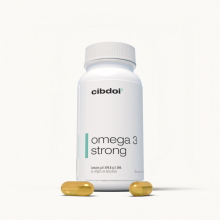How Long Should I Take Omega-3 Supplements?
Published:
Omega-3 fatty acids like EPA and DHA provide a multitude of health benefits. Many people take fish oil or algal supplements to increase their omega-3 intake.
Contents:
But with daily use of omega-3 supplements being so common, questions arise around how long they should be taken. Is omega-3 supplementation something you should do short-term or indefinitely?
Below is a detailed look at the evidence on how long omega-3s should be taken to support health based on your specific goals.

An Overview of Omega-3s
Omega-3s are polyunsaturated fatty acids that play many important roles in the body. The three main types are:
- EPA (eicosapentaenoic acid) – Has strong anti-inflammatory effects. Mainly found in seafood.
- DHA (docosahexaenoic acid) – Important for brain and eye health. Also primarily obtained from fish.
- ALA (alpha-linolenic acid) – Found in plant oils. The body can convert ALA to EPA and DHA in small amounts.
Omega-3s provide a multitude of functions. Here are some of the evidence-based benefits:
- Fight inflammation and oxidative stress
- Support heart health
- Aid brain development and cognition
- Improve mental health and mood
- Enhance eye health and vision
- Promote healthy pregnancy and fetus development
- Reduce risk for many chronic diseases
- Improve skin, joint and muscle health
With such a broad range of benefits, omega-3 intake is important over a lifetime. But how long do you need to take supplements to experience the benefits?
General Health and Longevity
For overall wellness and longevity, omega-3s should be consumed indefinitely as part of a healthy diet and lifestyle.
However, supplements themselves don’t necessarily need to be taken forever. Here are some general guidelines based on research:
- To initially increase omega-3 status in those deficient, 6-12 months of daily supplementation is recommended.
- For maintenance after repleting stores, aim for at least 8-12 weeks of omega-3 supplements per year.
- Periodic 1-3 month breaks in supplementation are reasonable for most healthy adults once an optimal omega-3 status has been achieved through diet and supplements.
- Routinely monitor omega-3 index levels via blood tests to determine if more or less frequent supplementation is needed for you. An index above 8% is ideal.
The key is ensuring you maintain optimal omega-3 status through all life stages for disease prevention and longevity. Supplements can be taken short or long-term as needed based on monitoring.
Heart and Brain Health
For maximizing benefits for the heart and brain, daily omega-3 supplementation should be indefinite, especially in higher risk adults.
Research on heart health suggests:
- Continuous omega-3 intake significantly reduces risk of coronary heart disease events and death.
- Those with established heart disease benefit from lifelong daily EPA/DHA supplementation.
- Higher risk adults should maintain omega-3 index levels above 8% continuously through supplements and diet.
For brain health and cognition:
- Daily DHA intake maintains optimal brain DHA levels as we age.
- Higher EPA/DHA levels reduce cognitive decline, dementia and Alzheimer’s risk in older adults.
- Omega-3s support brain development in fetus and children when mom consumes them regularly.
Because it takes time to deplete omega-3 stores, heart and brain benefits may persist for 3-6 months after stopping supplements in younger healthy adults. But lifelong daily intake is ideal.
Mental Health
For mood disorders like depression, omega-3 duration depends on the condition:
- For major depressive disorder, at least 3-6 months is recommended. If effective, continue taking as prescribed by your doctor.
- For milder mood issues, 1-2 months of omega-3s may provide lift. Interval supplementation as needed is reasonable.
- For seasonal affective disorder, start 2-3 months before typical symptoms begin and supplement through the winter season annually.
Work with your mental health provider to determine the appropriate omega-3 supplementation regimen for your needs.
Inflammation and Joint Pain
Due to their anti-inflammatory effects, omega-3s can minimize inflammation-based conditions. Duration suggestions include:
- For inflammatory arthritis, aim for daily supplementation indefinitely to reduce flare-ups.
- For occasional aches and pains, 1-2 months of omega-3s may offer relief as needed.
- To mitigate seasonal allergies, supplement for 2-3 months prior to and during peak allergy season.
- For post-workout soreness, continue taking for 1-2 months or as long as needed for benefits.
Monitor your symptoms and adjust your omega-3 protocol accordingly in discussion with your doctor.
Pregnancy and Child Development
Pregnancy and childhood are crucial periods where omega-3s support healthy development:
- For pregnancy, supplement with 300-600 mg DHA daily from preconception through delivery.
- While nursing, continue taking DHA supplementation to enhance breast milk levels.
- For infants and toddlers, supplement with an algae-based DHA as recommended by your pediatrician.
- For older kids, aim for one to two servings a week of low mercury fish. Add kid-friendly omega-3 foods like fortified yogurt.
Adequate omega-3 intake is vital during the first 1,000 days from pregnancy through early childhood for proper development. Work with your OB/GYN and pediatrician to determine the best omega-3 protocol.
How Long Should I Take Omega-3 Supplements? Conclusion
In summary, while omega-3 supplements can be taken short-term for targeted benefits, the most common recommendation is daily long-term intake for optimal wellness.
For heart health, brain function and fetal development, continuous lifelong daily omega-3 consumption is ideal.
General health maintenance, mood support and pain relief allow for more flexibility on duration. Take for at least 1-3 months initially, then as needed or seasonally.
Testing your omega-3 index levels periodically helps determine if more supplemental EPA/DHA is required. The key is maintaining optimal omega-3 status across your lifespan.










